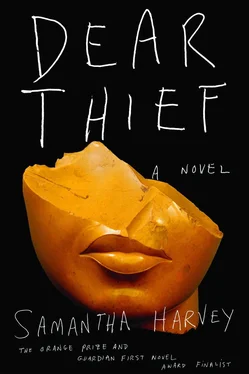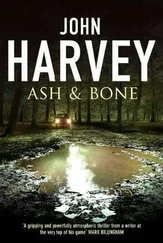He stands there as if in terror. There are aspects of this imagined night that I felt I was not making up, and this is one of them. I lay in the lamplight and I could see him at the window, unblinking and paralysed by the inevitability of the scene he has set up and which now overwhelms him. I know this feeling, I have had it thigh-deep in the sea as a nine-foot wave rears and thunders in. You lean down into your bag and take out a tin, which contains pre-rolled cigarettes, light one, light another off yours and hold it out to him. You tell him what it is; you have injected your last, now you just have these two left to smoke and that will be that. No more. After tonight you are getting out of this disagreeable habit.
Nicolas has never done such a thing. He extends his arm to say you will have to bring it to him. An attempt at asserting some power over you. You do. At the window you rest your weight on one leg and look out as you smoke, perfectly unbothered by your visibility in a lit room on a dark night. He goes to where you sit on the bed and makes his first inhalation deep and reckless, and expects something. When there is nothing left to smoke and he still feels normal — if stricken with anguish, longing and anger can be considered normal — he lies back on the bed and counts the flower, leaf, flower, leaf that alternate around the ceiling rose.
If my decision to stay at Mrs Ellis’ seems perverse to you, I should say that one of the main reasons was to establish whether Nicolas did or did not use heroin that night. If he did it would have been the first and last time, I have no doubt about that — and all the more transformative for it. This was always a question that bothered me and one I could never decide on, or ask him. When he came back home two days later, to pack his bags, something in him had changed, this is all I can say. As if a chemical change, not only in his demeanour but in his brain, as if a crucially nervous, searching part of his brain had been unplugged and had left him relieved of the kind of peripheral anxiety and unease we pray God to remove, if religious — or simply live with, if not.
Of course, the room had no answers in itself. All the same, an answer came. I don’t know if it was right, it didn’t need to be right, it only needed to be an answer. Of course he used the drug; he sat there on the end of the bed, leant forward, elbow on knee, and cast you nervous, accusatory glances as he smoked. At some point it started raining and I got up to close the window when the rain began clattering down in poles. From the room opposite mine sounds came through the rain, that violent gratification that is incapable of censoring itself, the woman finally shrieking, which was so subtly but profoundly unlike a shriek of pain, and carried a kind of song.
One day I suppose I will be able to laugh at the unfortunate twist of that soundtrack; without it maybe I would have imagined a cooler, more indifferent night in the lavendery chintz of Mrs Ellis’ room, maybe I would have decided you had not offered him anything to smoke or that the night had been sullen, resentful and regrettable and only briefly pleasurable. I might not have imagined the blood slowly warming and the immense light and euphoria you described, Nicolas taking off your one remaining item of clothing, the green headscarf that had made you look so defiant and inappropriately proud at the station earlier that day. His hands on your waist, your breasts, your face, your hair.
In the night I got up to make a drink and had to settle for black coffee from one of the sachets — this is how I know there was no tea, or milk. Do you know, when Nicolas grabbed your wrist in the garden and pushed you into the car and drove you to the station, I had no idea if he was going to hurt you and I was worried. I was good enough to be worried. I wondered if I should have protected you, but then protecting you from Nicolas seemed preposterous as things go, so then I worried about myself. I waited something like three hours before going to the station to see what had happened to him, and I expected to see you both in the car, as you and I had been only a few hours before, or to see Nicolas holding the steering wheel quietly, trying to rid himself of you finally before turning round and coming home. What I found was the car with the keys in the ignition, and both of you gone. I drove home. It was two days before I saw him again and even then he came only to apologise and to tell me you had disappeared once more, and to pack.
There was something about you that made Nicolas animated and angry. Do you remember that same day how he stormed indoors when you said all that about Laurence Olivier. ‘I’ve been in an elevator, looking for love,’ you said when we asked you once again where you had been for almost two years. ‘Did you find it?’ ‘No.’ ‘You look unwell, what do you need?’ ‘Nothing.’ ‘There must be something, you don’t look well.’ ‘I wanted to find Laurence Olivier, it turns out he doesn’t exist. Now that the one thing I needed is gone, I don’t need anything.’ And he stood from the wrought-iron table in the garden, and he must have been making a windbreak of sorts because the leaves on the table flew upwards when he went; I remember this so distinctly because it looked like they were fleeing his anger, and you winced. It was a theatrical wince and I was glad he had not seen it.
The wind blew, the leaves flew, the sky was as big and grey as a road to nowhere with no one on it, your hair wafted smoke and evergreen, the pipistrelles came out in the dusk, rain stirred, flakes of enamel paint from the table stuck to our thumb pads, Nicolas came outside again and clutched your wrist and yanked you to your feet and took your bag and pushed you into the car. ‘I am getting out,’ you said to me as you left, with flat reassurance. ‘I just want you to know that I am getting out.’ This is what I kept thinking of as I sat in the dark, drinking watery coffee; did you get out? Here, in this room, did you begin to? Did you and Nicolas pass through each other’s flesh into something else, did you find something, were you rewarded, was it happiness?
What is the injury? What is the extra injury , Butterfly? The two of you had done this before, after all. What takes the thorn from the side to the heart, what decides if the heart is punctured? I know the answer, and yet it is never quite a complete one. Spain — Spain is lustful and heady, full of grand but futile gestures, Spain hosts the bullfight and the things that seem glorious but are not, and these things come to nothing, to no good. These things begin to sicken us when the music and colour are gone. What happens there happens in a degenerative heat that we have to forgive or else simply accept, just as we would the beautiful vulgar flowers and the moths as big as bats.
But England is cool-headed and premeditated. Mrs Ellis has put out a little vase of first snowdrops that are greener than they are white, she has put pouches of lavender under the pillows and the cotton is clean and cold. The radiators struggle against the draughts through the old windows. She has left a hot-water bottle in the bed in its own little island of warmth. Passion has a thousand places to leak from, but still it comes, and it comes so heavily that it crushes a marriage, which I picture, despite myself, as a train crushing a deer.
Nicolas gathers your hair in his fist and cuts, or — and this is something I have not ever been able to decide — he gathers it and asks you to cut, so that it is you who makes the offering. He always had a certain prescience, or at least a long range in his thoughts, and I am sure that when he went to get scissors he knew he was unlikely to wake up in the morning and find you there. He was a gracious man fundamentally, and I say this without irony. He is the kind of man who would hear you get up and leave before dawn and pretend to be asleep. Then get up a couple of hours later and go down to a breakfast with the lock of hair wound around his fist, to a solitary breakfast of perfect eggs and tea brewed amber and Mrs Ellis’ motherly hands fussy over warm pots.
Читать дальше












